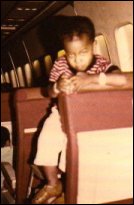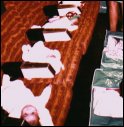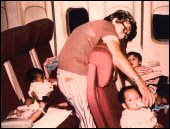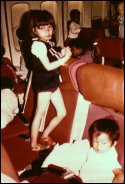Orphan Airlift Pan Am April 5, 1975
Remembering the 1975 Vietnam Babylift - Pam Am airlift.
 "We
cannot forget the living while mourning the dead." These were the words
of President Gerald Ford coming over British radio in Hong Kong on Saturday
morning, April 5, 1975. I was getting ready to leave for the U. S. Embassy where
a group would leave for Saigon to assist in an airlift flight of orphans.
"We
cannot forget the living while mourning the dead." These were the words
of President Gerald Ford coming over British radio in Hong Kong on Saturday
morning, April 5, 1975. I was getting ready to leave for the U. S. Embassy where
a group would leave for Saigon to assist in an airlift flight of orphans.
How did I find myself here? In 1973 I had graduated from an Associate Degree nursing program. The following school year I was taking classes towards a Bachelor of Science degree while working as a school nurse at a private Christian college in the northern California Napa Valley area. A year ago I accepted a volunteer position as an instructor at the Hong Kong Adventist Hospital School of Nursing in Tsuen Wan (located in the New Territories section of Hong Kong). At 23, I had just recently made the decision to stay on for a second year.
Friday evening, April 4, I received a phone call at 4:45 p.m. from Dr. Robert Dunlop at our sister hospital on Hong Kong Island. He asked "How would you like a free trip home?"
I assumed he was teasing and laughingly answered, "Who are you, Santa Claus?"
"Seriously, the U. S. Embassy has put out a call for fifteen to twenty American women with current re-entry visas who are free to escort a planeload of Vietnamese orphans to the U. S.," was his reply. Dr. Dunlop had been asked to be the doctor on board and to bring some RN's with him. There would be a free return ticket to Hong Kong afterwards, but I would have to let him know my decision by 5:30 p.m.
I made a quick call to the Nursing School director. Next week was test week for Winter quarter, followed by Spring Break. Miss Howe urged, "Don't pass up an opportunity like this! I'll oversee your tests for you next week."
When I called Dr. Dunlop back at 5:00 p.m. he said they had already closed out the list but had put my name on it.
Stunned, I listened to a report of the C-5A cargo jet that had crashed the day before, killing many children and adults in an airlift similar to the one I was about to leave on. An explosion had blown off a door of the plane shortly after takeoff and it had crashed while attempting to return to the airport. The only details that I heard before leaving for the Embassy was that sabotage could not be ruled out, but the airlifts would continue.
At the U. S. Embassy we were told that due to the escalating situation around Saigon, the list had been narrowed down to only ten RN's. Americans evacuating out of Vietnam would assist with escorting the children. Our final group consisted of Dr. Dunlop and three nurses from Hong Kong Adventist Hospital, the Ambassador's wife, and five other RN's. We were bussed to the airport where a donated Pan Am 747 was prepared to leave.
As we lifted off from Hong Kong, a somber sense of uncertainty about what would take place next filled the air. Once we were airborne a stewardess announced, "In view of the circumstances, I feel it would be appropriate to ask Dr. Dunlop to say a prayer for our safety," and handed him the mike. Soon we were busily concentrating on setting up bassinets and supplies, trying not to worry about what would happen next.
During my year in Hong Kong I would only catch bits and pieces of information from British radio about what was considered primarily an American war in Vietnam. Basically I was just aware that the Viet Cong were at the outskirts of Saigon, and that many were attempting to evacuate or escape any way they could.
 For security reasons, on touchdown in Saigon, our plane
was kept out on the runway where the babies were brought for loading. In a whirlwind
the plane door was opened, letting in a rush of warm, humid, tropical air and
people. Holt International personnel brought in boxes full of case files
and medical records for all of the children. A steady stream of babies and children
quickly loaded. Each one had a white ID band on one arm with its Vietnamese
name and case number. On the other arm was a band with the adopting parent's
name, matching case number, and color coded for a final destination of Seattle,
Chicago or New York. The final count was 409 orphans, 300 of which were
under a year and a half old. There were bassinets in seats, under seats
and in aisles.
For security reasons, on touchdown in Saigon, our plane
was kept out on the runway where the babies were brought for loading. In a whirlwind
the plane door was opened, letting in a rush of warm, humid, tropical air and
people. Holt International personnel brought in boxes full of case files
and medical records for all of the children. A steady stream of babies and children
quickly loaded. Each one had a white ID band on one arm with its Vietnamese
name and case number. On the other arm was a band with the adopting parent's
name, matching case number, and color coded for a final destination of Seattle,
Chicago or New York. The final count was 409 orphans, 300 of which were
under a year and a half old. There were bassinets in seats, under seats
and in aisles.
I was overwhelmed as I watched the endless flow of little ones pouring into the plane filling every available space. Some were even being handed over by their mothers. Many were obviously not full Asian. I guessed they probably had American GI fathers. I could only wonder how many families on both sides of the Pacific were being impacted by this one planeload of children. Would we ever know what happened to any of them?
My responsibilities were in first class where the babies who were in need of scheduled medications or closer watching were located. The first baby I took care of was so tiny and fragile. It looked like a preemie, but according to the name band was about four months old. It was in respiratory distress, poor color and showing signs of dehydration. Soon it was transferred upstairs to the VIP lounge, a.k.a. ICU unit, for IV's and closer monitoring. Later I heard that it was dropped off in Guam with meningitis and didn't survive. Often I've wondered: Who was this baby? How did it end up on our plane? What family was anticipating its arrival? Why couldn't it have hung on just long enough for the help and future waiting on the other end?
 None of us got any sleep during the thirty hour long flight to
Seattle. We had to keep our watches set to Saigon time to ensure maintaining
medication and feeding schedules. When I would start to nod off while
feeding a baby, someone else would kindly remind me that there were many more
that still needed attention. How I longed just to be able to cuddle even
one precious little one, letting it sleep in my arms for the rest of the trip!
None of us got any sleep during the thirty hour long flight to
Seattle. We had to keep our watches set to Saigon time to ensure maintaining
medication and feeding schedules. When I would start to nod off while
feeding a baby, someone else would kindly remind me that there were many more
that still needed attention. How I longed just to be able to cuddle even
one precious little one, letting it sleep in my arms for the rest of the trip!
As would be expected under the circumstances, there was a certain amount of unavoidable confusion. For example, finding another baby in the bassinet when I tried to replace the one I had. Also, at each of our stops in Guam and Honolulu, we were restocked with a different formula. My heart went out to the babies who were in unfamiliar surroundings with disrupted routines and then subjected to formula changes. No wonder so many had diarrhea by the time we reached Seattle. Many also had heat rash from the plastic bassinets. A few had also broken out with chickenpox in route. But, in spite of these challenges, I must commend and thank Holt International for the over all organization. That is what made this flight a success.
I got off in Seattle to fly down to San Diego for a brief visit with my parents before returning to Hong Kong. My mother later sent me some articles about the flight.
 Fifteen years later, in 1990, NBC aired the movie "The
Last Flight Out" and I read some articles about the airlift and fall of
Saigon. Again I wondered: What ever happened to all of those children?
Fifteen years later, in 1990, NBC aired the movie "The
Last Flight Out" and I read some articles about the airlift and fall of
Saigon. Again I wondered: What ever happened to all of those children?
When I saw the May 2000 Reader's Digest cover and began reading the feature story my heart skipped several beats. Here was an update on how some of OUR BABIES were doing!
I can't begin to describe how it feels to look back on what seemed, at the time, to be a brief side trip and get a glimpse of the bigger picture from many different angles: the adoptees, the adoptive parents, other volunteers on the babylifts.
